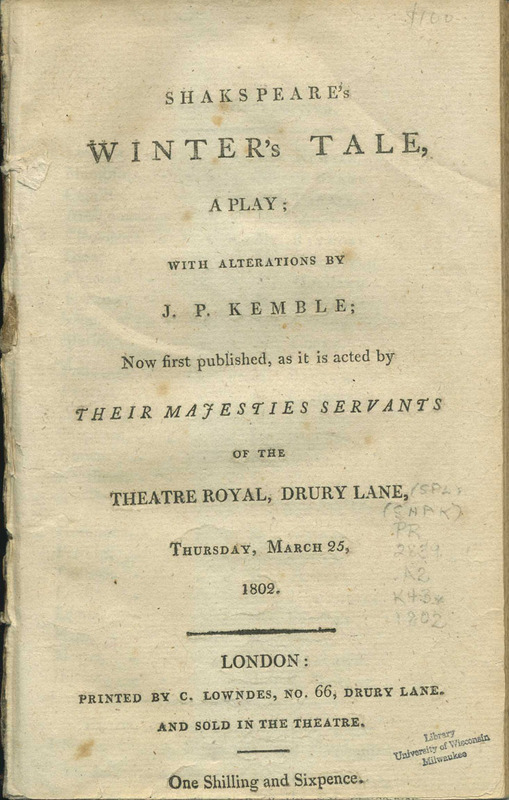Shakespeare's Winter's Tale
Shakespeare, William, 1564-1616.
Shakespeare's Winter's Tale, A Play; With Alterations by J.P. Kemble.
London: C. Lowndes, 1802.
Call Number: (SPL)(SHAK) PR 2839 .A2 K43x 1802
Shakespeare Research Collection, Golda Meir Library
An acting edition of a play is meant to present the text of a play as it is performed at a particular theater at a specific time, giving not the version of the original author but that of the company performing it or the actor/manager who prepares it for the stage. The title page usually gives nominal credit to the original author, but often the actor/manager who alters or amends or adds to the text gets equally good coverage. John Philip Kemble, considered the greatest actor of his time, was never shy about keeping his name in front of his public in this way.
The text of this acting edition represents Kemble's last production at Drury Lane, then under the managership of the playwright Richard Brinsley Sheridan, whom Kemble despised, partly as thwarting Kemble's admirable desire to increase the "drawing power" of Shakespeare through careful and authentic productions.
In the case of one of the less popular plays such as The Winter's Tale, Kemble's effort was actually a noble ambition. From the mid-1700s to Kemble's time, the play had been seen only in truncated adaptations. Yet even Kemble makes significant changes in the text. For example, one of the most discussed scenes is a debate -- on Nature versus Nurture -- between the King of Bohemia and a young woman presumed to be a shepherd's daughter. Kemble cuts the debate. Even as actor/manager at Covent Garden and thus free of Sheridan's control, Kemble continues to offer his altered version of The Winter's Tale. He not only cuts several major speeches but subtly alters characterization and, in the last scene, replaces Shakespeare's restrained ending with the overly-emotional, melodramatic ending of Garrick's Florizel and Perdita.

